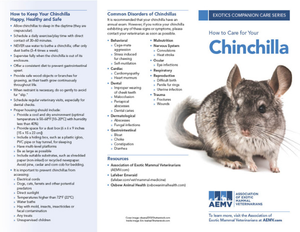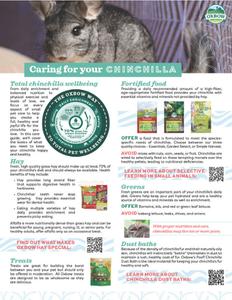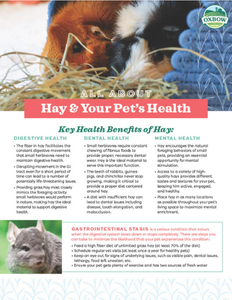Caring for your Pet Chinchilla
Expert Veterinary Care for Your Softest Companion
Chinchillas are intelligent, active, and incredibly soft pets that require specialized care to thrive. At Main St. Veterinary Hospital, we’re here to help you provide the best possible care for your chinchilla with guidance on proper diet, housing, handling, and health care.
Housing & Environment
Chinchillas need a clean, safe, and enriching environment to stay healthy and happy.
Cage Recommendations:
-
Size: Tall, multi-level cages are ideal for climbing and jumping.
-
Material: Wire cages with solid flooring to prevent foot injuries.
-
Temperature: Keep between 60–70°F. Avoid heat and humidity—chinchillas can easily overheat.
-
Bedding: Use dust-free paper bedding or kiln-dried pine. Avoid cedar or non-kiln-dried pine.
Enrichment:
Provide wooden chew toys, climbing shelves, tunnels, and dust baths at least 2–3 times per week.
Diet & Nutrition
A balanced diet is key to preventing gastrointestinal and dental issues.
Essentials:
-
Hay: Unlimited access to fresh timothy hay or orchard grass.
-
Pellets: High-quality chinchilla pellets (avoid those with seeds or colored bits).
-
Water: Fresh, clean water daily in a bottle or heavy dish.
Foods to Avoid:
Fruits, nuts, sugary treats, and dairy products—they can upset digestion.
Grooming & Hygiene
Chinchillas have dense fur that should never get wet.
Dust Baths:
-
Offer a dust bath 2–3 times weekly using chinchilla-specific dust, not sand or regular dirt.
-
Remove the dust after 10–15 minutes to prevent contamination.
Fur Maintenance:
-
Never bathe a chinchilla with water.
-
Check for matted fur, especially behind the ears and under the arms.
Health Care & Common Issues
Chinchillas are prone to specific health concerns. Regular checkups help catch problems early.
Common Issues:
-
Dental disease: Overgrown molars or incisors can cause drooling, weight loss, or difficulty eating.
-
GI stasis: Signs include lack of appetite, small droppings, or lethargy—an emergency in chinchillas.
-
Heatstroke: Rapid breathing, drooling, or weakness during warm weather requires immediate care.
-
Fur slip: When scared or mishandled, chinchillas can release patches of fur.
Veterinary Care:
-
Schedule yearly wellness exams. Early detection is key to treating illness in Chinchillas.
-
Spaying/neutering is rarely needed but may be discussed if behavioral issues arise.
-
Parasite control is rarely necessary indoors but should be addressed case-by-case.
Handling & Bonding
Chinchillas can be loving companions if socialized properly.
-
Always support the body, especially the hindquarters.
-
Avoid squeezing or restraining tightly—they are fragile and can become stressed.
-
Let your chinchilla come to you and interact on their terms.
If you have questions about your chinchilla’s care or are noticing any changes in behavior, appetite, or activity, contact us right away. Our veterinary team is experienced in exotic pet care and ready to help.
At Main Street Veterinary Hospital, we’re more than just a clinic — we’re a trusted partner in your exotic pet’s health. Our compassionate team combines advanced veterinary knowledge with a deep love for animals of all kinds.
Ready to schedule an appointment?
Call us today at (405) 329-6555 and let us help your exotic pet live a long, healthy life.




